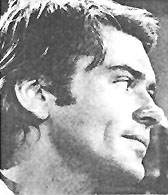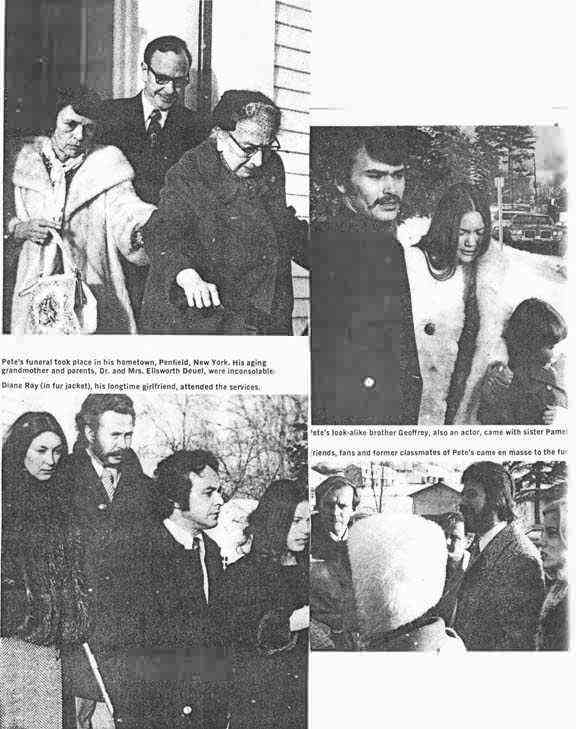- FROM THE GRAVESITE, WEEPING MOTHER
ADMITS--
PETE DUEL'S FAMILY KNOWS WHO REALLY KILLED
HIM!
THE "TWIN" SON THEY FEAR WILL
BE NEXT
by Al Crowley
Movie Mirror, April 1972
It was a cold Wednesday afternoon, but the Penfield
Baptist Church was filled to the brink. The first week of the
New Year found hundreds of friends and family in Penfield, a
suburb of Rochester, New York, to mourn the death of its hometown
boy who made it big in Hollywood--but couldn't live it big, who
really couldn't live at all.
Pete Duel was his name. A 31-year-old
actor who had struggled to break into the Hollywood star system
and who was just beginning to receive well-deserved praise for
his TV series, ABC's ALIAS SMITH AND JONES. But Pete was getting
little joy from it...
The black limousine pulled up in front
of the church. Pete's look-alike brother, Geoffrey, stepped out
of the car. He held out a helping hand to his grandmother. Pamela,
his younger sister, followed closely behind. Pete had helped her
make it in a singing group out on the West Coast. He was so excited
when she opened in Las Vegas.
Pete's parents, Dr. and Mrs. Ellsworth
Deuel slowly emerged from the car. His father held his mother's
arm supportingly as they climbed the few steps up to the church.
The Deuel family sat in the front pew of the church which was
decorated with three unobtrusive flower arrangements. Diane Ray
sat behind the family.
Diane Ray, Pete's longtime girlfriend,
was in the house that fateful evening, the night before the New
Year. He had invited her to watch his show on the TV. In the middle
of the program, Pete switched to a basketball game in a fit of
self-disgust. Confused, Diane left the livingroom. She fell asleep
in the bedroom, leaving Pete, perhaps with the thoughts that ultimately
ended his life.
When he walked into the bedroom, Diane
woke up. She saw him take a wrapped box from the dresser, tear
the paper off and remove a .38 caliber revolver from the box.
"I'll see you later," he muttered to her and walked
into the living-room. That was 1:25 a.m., December 31st.
Before Diane could even absorb what Pete
had done, a shot thundered through the whole house. And there
was Pete, dead with the gun by his side, near the Christmas tree
they had decorated together....
Pete's body was brought to rest in the
town he loved. Pictures of his hometown, Penfield, painted by
a local artist were all over the walls of his Hollywood home.
Over 2,000 people came to the Penfield funeral home. In fact,
special sherrif's units were sent out to direct the traffic that
was backed for over a mile.
Two days before, over a thousand fans
and television celebrities attended a memorial service for Peter
in the Self-Realization Fellowship Temple in Los Angeles. Pete
had hoped this group could help him find a reason for living.
Why couldn't Peter find happiness--and
why was he finally driven to take his own life? At the funeral,
as one looked at his mother's tear-strained face, she seemed to
say, "My son. My Pete. I know you always wanted to be a star--even
as a little boy I remember you pretending to be an actor. But
I knew it was no good for you. I knew it wouldn't bring you happiness.
Being an actor is the roughest thing in the world, and you have
to be made of steel to take it. And you, Pete, you had a soft,
kind heart...You were not meant for this kind of crazed life.
Pete, why did you ever leave Penfield where your family and friends
were?" But Mrs. Deuel knew that it was too late to help her
son Pete but what of Geoffrey, who people mistakenly took for
Peter all the time--what about Jeff? He was following right in
his older brother's footsteps--an actor too...
Peter had been having emotional problems
for quite awhile. He drank excessively. On October 24, 1970, he
was in an auto accident in which he pleaded guilty to charges
of driving while intoxicated before a Santa Monica judge. A week
before Pete shot himself, he shot at a telegram framed and hung
in the hallway of his home--a telegram which informed him he had
lost election to the Board of Directors of the Screen Actors'
Guild.
In an interview here last year, Pete said,
"After talking about pictures and how they're made and what
I'm going to do next, there's nothing more to say." He then
told the interviewer. "There's nothing much to smile about
anymore."
And so, friends and family had come to
the little church that day to, as the minister said, "Honor
the good and kind in Peter."
Pete's uncle, Theodore J. Ellsmore, echoed
these words when he described his nephew as a "kind and good
person who never forgot his family and friends. Whenever something
big was happening in the family, he was always here. We all loved
him." Little more than a week before that, Pete was in Rochester
spending Christmas Eve with his uncle.
The friends who had come to the memorial
service that day included middle-aged couples dressed "appropriately"
in dark dresses and suit and ties, long-haired types with bell-bottomed
jeans and dungaree jackets and young teenage fans.
"Pete was the kind of guy who could
make friends with anyone," a high school classmate said.
Someone Pete knew for only a few weeks in New York while he was
in acting school took a bus up from Brooklyn last night. One classmate
had flown all the way from Seattle to be with the Deuel family.
At the simple half-hour service, the pastor
of the church read two poems. One, written by Pete as a junior
at Penfield High School, spoke of life and death, that death is
"just the end of a glorious fall." His mother wrote
the other, "What is a Child?" on the long plane ride
back from the Los Angeles memorial service.
She wrote that "a child is like the
day/ As some days are long, and some short,/ So is the life of
a child...So too/ as the sun sets to rise again,/ Our life sets
to rise again,/ to know no end."
No one knows for sure who Pete Duel really
was or what made him pull the trigger on himself. His girlfriend,
Diane, still insists that his death was an accident, although
the coroner's report said he died from a "self-inflicted
gunshot wound" and the Los Angeles police called it suicide.
But one thing is clear, Pete was a terribly unhappy, despairing
man who, suffered deeply. He chose the only way he saw out of
his misery.
Is his family right in thinking that Pete
would be alive today if he had not journeyed to the tinsel city
to find his fortune--to be an actor? Did Hollywood and all its
painful disappointments emotionally and spiritually kill Pete?
One can never know the answer. But the family's fears for "twin"
son Geoffrey are certainly understandable after having suffered
such a tragedy as the death of Pete. 
Back to Articles List

